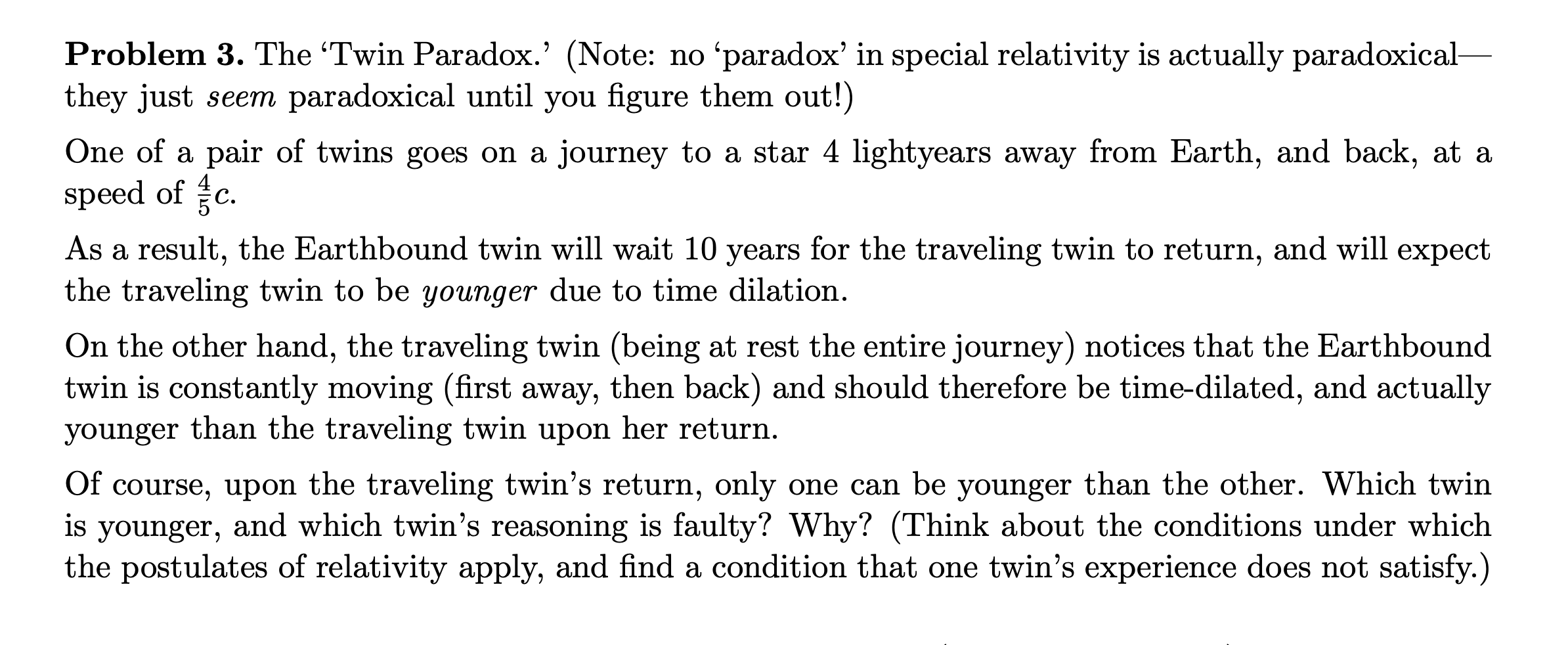Problem 3. The 'Twin Paradox.' (Note: no 'paradox' in special relativity is actually paradoxical- they just seem paradoxical until you figure them out!) One of a pair of twins goes on a journey to a star 4 lightyears away from Earth, and back, at a speed of c. As a result, the Earthbound twin will wait 10 years for the traveling twin to return, and will expect the traveling twin to be younger due to time dilation. On the other hand, the traveling twin (being at rest the entire journey) notices that the Earthbound twin is constantly moving (first away, then back) and should therefore be time-dilated, and actually younger than the traveling twin upon her return. Of course, upon the traveling twin's return, only one can be younger than the other. Which twin younger, and which twin's reasoning is faulty? Why? (Think about the conditions under which the postulates of relativity apply, and find a condition that one twin's experience does not satisfy.) is
Problem 3. The 'Twin Paradox.' (Note: no 'paradox' in special relativity is actually paradoxical- they just seem paradoxical until you figure them out!) One of a pair of twins goes on a journey to a star 4 lightyears away from Earth, and back, at a speed of c. As a result, the Earthbound twin will wait 10 years for the traveling twin to return, and will expect the traveling twin to be younger due to time dilation. On the other hand, the traveling twin (being at rest the entire journey) notices that the Earthbound twin is constantly moving (first away, then back) and should therefore be time-dilated, and actually younger than the traveling twin upon her return. Of course, upon the traveling twin's return, only one can be younger than the other. Which twin younger, and which twin's reasoning is faulty? Why? (Think about the conditions under which the postulates of relativity apply, and find a condition that one twin's experience does not satisfy.) is
Related questions
Question
Can you answer problem 3?

Transcribed Image Text:Problem 3. The 'Twin Paradox.' (Note: no 'paradox' in special relativity is actually paradoxical-
they just seem paradoxical until you figure them out!)
One of a pair of twins goes on a journey to a star 4 lightyears away from Earth, and back, at a
speed of c.
As a result, the Earthbound twin will wait 10 years for the traveling twin to return, and will expect
the traveling twin to be younger due to time dilation.
On the other hand, the traveling twin (being at rest the entire journey) notices that the Earthbound
twin is constantly moving (first away, then back) and should therefore be time-dilated, and actually
younger than the traveling twin upon her return.
Of course, upon the traveling twin's return, only one can be younger than the other. Which twin
younger, and which twin's reasoning is faulty? Why? (Think about the conditions under which
the postulates of relativity apply, and find a condition that one twin's experience does not satisfy.)
is
Expert Solution
This question has been solved!
Explore an expertly crafted, step-by-step solution for a thorough understanding of key concepts.
Step by step
Solved in 2 steps
